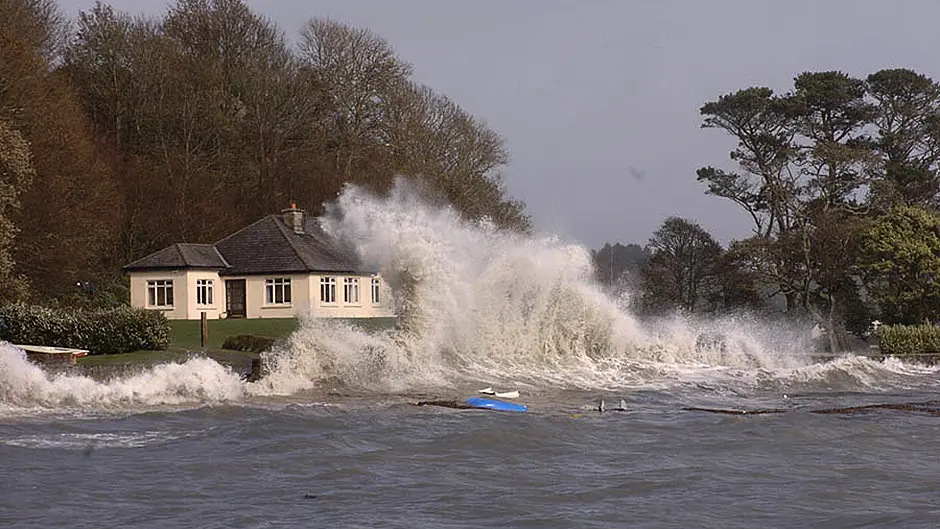We do not have time for ‘fireside chats' on climate change. The best information about weather saves lives and a lot of money, but only if it based on informed decisions, writes maritime lawyer Michael Kingston
We do not have time for ‘fireside chats’ on climate change. The best information about weather saves lives and a lot of money, but only if it based on informed decisions, writes maritime lawyer Michael Kingston
IRELAND must, without hesitation, apply for ‘Observer Member’ status of the Arctic Council.
Ireland’s focus in relation to climate change is constrained and side-tracked by a constant vision in general towards the South East (Europe) and the South West (United States).
Much as we hugely value those relationships for so many reasons there is another horizon to our North that we must also engage with as a matter of priority – to gain the critical knowledge needed to help make informed decisions about coastal erosion and flood defences, planning, agriculture, fishing, and safety that are all dependent on local weather predictions.
We need the best information and we do not have that without speaking to our Arctic neighbours.
Established in 1996, the Arctic Council is the leading intergovernmental forum promoting co-operation, co-ordination and interaction among the Arctic States on common Arctic issues, in particular on issues of sustainable development and environmental protection in the Arctic.
The Arctic States are USA, Canada, Russia, Norway, Sweden, Denmark (Greenland), Finland, and Iceland.
The organisation is not a law-making body, but much of the consensus reached is pursued in national legislation, and in international forums.
The Arctic Council allows, without a fee, Observer Member status. States have joined for access to discussions and information about the effect of Arctic weather patterns on the lower latitudes.
There is a huge focus in active Working Groups on monitoring the Arctic Environment – all aspects – including ice melt and changing ocean flow and weather patterns.
The current Observers are France, Germany, Italy, Japan, The Netherlands, China, Poland, India, South Korea, Republic of Singapore, Spain, Switzerland, and the United Kingdom.
Despite being such a close neighbour, and indeed with natural historical links with the Arctic nations, Ireland is not a member.
Yet, Ireland’s climate is critically dependent on the regulation of the Gulf Stream by the Arctic, and the balance of the Jet Stream, which arebeing discussed in depth in these Arctic Council Working Groups.
The Gulf Stream hits Ireland’s shores, bringing warm water from the Gulf of Mexico and across the Atlantic. Ireland sits very high up in the world, higher than St John’s in Newfoundland in Canada, yet when it is freezing in St John’s, and at a similar latitude to Ireland’s is Siberia, Russia. It is moist and warm in Ireland with sub-tropical gardens on Garinish Island in Bantry Bay, and more flora per square foot in the cracks and crevasses of the Burren than anywhere else on earth.
The Arctic acts like a refrigeration system – when the Gulf Stream has warmed Ireland – then Scotland – then North West Norway, it goes into the Arctic Circle and back down the Western Atlantic, by then, of course, much colder – having intermingled with billions of tonnes of ice.
But due to record ice melt in the Arctic Circle, the Gulf Stream’s regulation is changing.
As it returns south of Greenland, it is less cold. Therefore, there is more evaporation and more rain, causing more turbulence as the meteorological balance in the
mid-latitudes is affected.
Due to ice depletion, the warmer seas in the north are also affecting the balance of the Jet Stream above Ireland.
County Cork has not seen two dry days in a row since the beginning of July 2017. Our houses, towns and cities, are under constant threat of flooding. Our slurry tanks are full, but the ground is saturated during the illogical ‘spreading window’.
We have had to cut silage in November because the ground was so wet in August, September, and October. Our crop cultivation and production are being affected.
We have had to put extra moorings on our boats during hurricane Ophelia. It is therefore affecting everyone in our society, including our safety and our food security. In the meantime, Florida is experiencing cold snaps due to the jet stream’s turbulence that are unprecedented, as are other parts of the mid-Latitudes, including Ireland at times.
The recent extreme weather conditions are stark evidence of this.
So, we do not have time for ‘fireside chats’ on this issue. The best information about weather saves lives and a lot of money, based on informed decisions.
The good news is that An Tánaiste and Minister for Foreign Affairs Simon Coveney is heavily engaged on the issue.
He understands the critical importance of climate information, as well as the many other opportunities being an Observing Member will afford Cork and Ireland in other areas.
Cork County Council’s management team also understands this, and it is pleasing to see their commendable leadership in assuming responsibility for the Atlantic Seaboard South Region under the new National Climate Change Adoption Framework.
Observing Member status of the Arctic Council will majorly assist these objectives and will also demonstrate Ireland’s responsibility in helping to protect the world’s last frontier.
Everyone must now row in behind Ireland’s Arctic Call.
• Michael Kingston, a lawyer from Goleen, is a special advisor to the Arctic Council’s Protection of the Arctic Marine Environment Working Group, working closely with the World Meteorological Organisation. He has also given evidence to the House of Lords Arctic Committee and is on the Advisory Council of the All Party Parliamentary Group on the Polar Regions. He is liaising with Minister Coveney’s office regarding Ireland’s Arctic Council Application. He is also a part-time farmer and has a fishing background.








